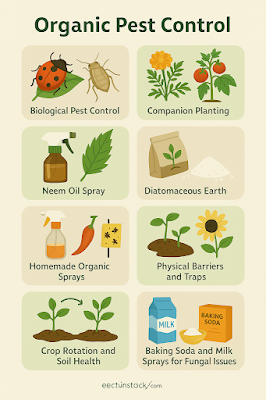Organic Pest Control Methods Every Farmer Should Know
Pests are one of the greatest threats to agricultural productivity. While synthetic pesticides offer quick results, their long-term use harms soil health, pollutes water, and disrupts ecosystems. Thankfully, organic pest control methods provide effective, eco-friendly alternatives. These natural techniques are safer for crops, consumers, and the planet. In this article, we explore essential organic pest control practices that every modern farmer should know.
1. Biological Pest Control
Natural pest control involves using predators or parasites to keep pest populations in check. Instead of chemicals, you let nature do the work.
Examples of beneficial insects:
-
Ladybugs – feed on aphids
-
Praying mantis – eats beetles, caterpillars, and flies
-
Nematodes – microscopic worms that target root-feeding pests
Benefits:
-
Long-term pest suppression
-
No chemical residues on crops
-
Supports farm biodiversity
2. Companion Planting
Certain plants repel pests or attract beneficial insects. By planting them near crops, you create a natural pest management system.
Examples:
-
Marigolds deter nematodes and whiteflies
-
Basil repels mosquitoes and flies
-
Garlic and onions keep aphids and beetles away
- Nasturtiums attract aphids away from main crops (trap crop)
Neem oil is extracted from the seeds of the neem tree (Azadirachta indica) and is one of the most effective organic pesticides.
How it works:
-
Disrupts the life cycle of insects (feeding, mating, egg-laying)
-
It works naturally to repel pests while also interfering with their growth cycle and reproduction.
When used properly, it poses no harm to helpful pollinators such as bees.
Application Tip: Mix 1–2 tablespoons of neem oil with water and a drop of mild soap. Spray on plant leaves during the early morning or evening.
This is a powder made from fossilized algae.It eliminates insects by dehydrating their outer shells, leading to their demise.
Ants
-
Slugs
-
Fleas
-
Cockroaches
Use: Dust around plant bases and entry points. It's non-toxic to humans and animals but avoid inhaling it.
5. Homemade Organic Sprays
Many common kitchen ingredients can be turned into powerful, chemical-free pest repellents.
Examples:
-
Garlic and chili spray – strong smell deters insects
-
Soap spray – breaks down soft-bodied insects like aphids
-
Vinegar spray – repels ants and fruit flies
Basic garlic spray recipe:
-
Drop a whole garlic bulb into your blender, add two cups of water, and whirl until you get a smooth, powerful concoction.
Let sit for 24 hours
-
Strain and dilute with 1 gallon of water
-
Spray directly on plants
Sometimes, the best defense is a physical one.
Techniques include:
-
Row covers – fine mesh that blocks insects while letting light in
-
Sticky traps – attract flying insects like whiteflies and gnats
-
Copper tape – deters slugs and snails
-
Netting – protects fruit trees from birds and insects
These methods are especially useful for small-scale or urban farmers.
7. Crop Rotation and Soil Health
Rotating crops each season helps break pest life cycles and reduces soil-borne diseases. Healthy soil also promotes stronger plants that resist pests naturally.
Tips:
-
Rotate root crops (e.g., carrots) with leafy greens or legumes
-
Feed your soil with compost and natural organic materials to boost its fertility and structure.
Avoid monoculture — diversify your planting
Planting flowers and herbs near crops attracts bees, butterflies, and beneficial wasps that help with pollination and pest control.
Great choices:
-
Lavender
-
Sunflowers
-
Dill
-
Yarrow
Creating a mini-ecosystem on your farm builds natural resistance to pests.
9. Baking Soda and Milk Sprays for Fungal Issues
While not strictly for insect pests, fungi like powdery mildew can harm crops too.
Solutions:
-
Baking soda spray: Mix 1 tbsp baking soda + 1 tsp soap + 1 gallon water
-
Milk spray: Mix 1 part milk with 2 parts water; apply weekly
Both are effective in preventing fungal growth naturally.
Organic pest control is not just about avoiding chemicals — it's about working with nature, not against it. These methods are sustainable, cost-effective, and align with eco-conscious farming goals. By implementing natural pest control strategies, farmers can protect their crops, preserve soil and water quality, and contribute to a healthier environment
